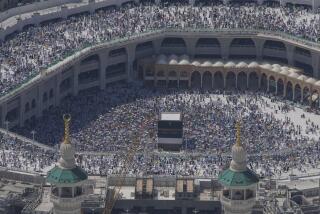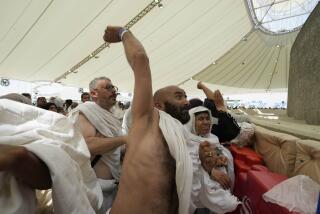Show of Sunni-Shiite unity in Iraq
- Share via
SAMARRA, IRAQ — Sunni Arab residents welcomed more than 1 million Shiite pilgrims to the city of Samarra on Friday to mark the anniversary of a Shiite saint’s death, local officials said, the latest sign of reconciliation among Iraqis eager to put the country’s civil war behind them.
Pilgrims gathered from all over Iraq after Shiite cleric Muqtada Sadr called for worshipers to mark the holy day in Samarra. Security was tight and there were no reports of attacks.
The calm was a remarkable feat in a city where Sunni militants three years earlier had bombed the Golden Mosque and ignited the civil war between the sects that left tens of thousands dead. A Sunni mosque even hosted Shiite pilgrims for a prayer service to commemorate the death in 874 of Imam Hasan Askari.
“This pilgrimage has exceeded all expectations,” said Samarra Mayor Mahmoud Khalaf, who estimated there were more than 1 million visitors in the mostly Sunni city. “It serves the unity of Iraq.”
Shiite pilgrims visited the Golden Mosque, which was attacked in late February 2006 by members of Al Qaeda in Iraq and is now in the final stages of reconstruction. The Shiite shrine has a mausoleum holding the remains of Askari and his father, Imam Ali Hadi, descendants of the prophet Muhammad.
It was in Samarra that Askari’s son, Mohammed Mahdi, disappeared as a child. Many Shiites believe that the son will return in the world’s darkest hour and usher in an era of justice.
About 5,000 Sunnis and Shiites attended a joint prayer Friday at Samarra’s Grand Mosque and chanted slogans denouncing sectarian violence. “Sunni and Shiite brothers, this homeland won’t be betrayed,” they said in unison.
The government deployed police around the city, eager to prevent attacks and to prove that the country had turned the page on sectarian violence.
Despite the major decline in violence, assassinations and suicide bombings still occur on a regular basis. Iraq’s Sunnis, Shiites and ethnic Kurds have yet to agree on power-sharing, and tensions among them could still derail efforts to achieve lasting stability.
Last month during another Shiite festival in southern Iraq, a suicide bomber killed at least 30 pilgrims on their way to the holy city of Karbala.
Some pilgrims in Samarra described the security forces as overwhelmed by the crowds and marveled that there had been no attacks. Others fretted that the measures were preventing them from touring Samarra, where they heard that residents had set up welcoming tents for them to rest.
“I was very delighted by the pilgrimage; I found absolute safety,” said pilgrim Nabeel Haidari, 34, who came from Karbala.
However, he complained that the security forces had kept the worshipers inside a zone near the shrine so they could not mingle with residents. “It’s like escaping a prison,” he said.
Even so, he planned to find a way to visit Samarra’s other famous sight, the Malwiya, a winding sandstone minaret, 170 feet tall, built in the 9th century, when the city was the seat of the Abbasid empire, which ruled most of the Islamic world.
In Baghdad, Prime Minister Nouri Maliki made his own call for reconciliation Friday. At a tribal gathering of fellow Shiites, broadcast on state television, he called for Iraqis to turn the page on their recent history. He appeared to be referring to those who supported Saddam Hussein’s regime.
“Today, we must reconcile again and this page of the bad history [should] be turned and [we must] not allow ourselves to remember it or to return to it,” Maliki said.
The prime minister warned that anyone who continued to fight the government would be committing “a double crime.” But, he added, “if he returns to Iraq, his family and his people, he is welcomed.”
Maliki has made similar calls before, though his statement Friday appeared to be the most pronounced plea to Iraqis affiliated with Hussein’s regime.
--
Rasheed is a special correspondent. Times staff writers Ned Parker and Saif Hameed in Baghdad contributed to this report.
More to Read
Sign up for Essential California
The most important California stories and recommendations in your inbox every morning.
You may occasionally receive promotional content from the Los Angeles Times.













